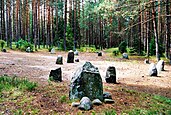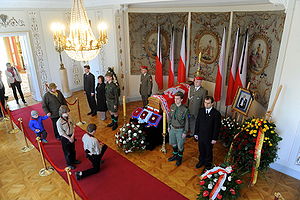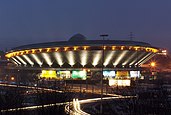Welcome to the Poland Portal — Witaj w Portalu o Polsce

 Poland is a country in Central Europe, bordered by Germany to the west, the Czech Republic to the southwest, Slovakia to the south, Ukraine and Belarus to the east, Lithuania to the northeast, and the Baltic Sea and Russia's Kaliningrad Oblast to the north. It is an ancient nation whose history as a state began near the middle of the 10th century. Its golden age occurred in the 16th century when it united with the Grand Duchy of Lithuania to form the Polish–Lithuanian Commonwealth. During the following century, the strengthening of the gentry and internal disorders weakened the nation. In a series of agreements in the late 18th century, Russia, Prussia and Austria partitioned Poland amongst themselves. It regained independence as the Second Polish Republic in the aftermath of World War I only to lose it again when it was occupied by Nazi Germany and the Soviet Union in World War II. The nation lost over six million citizens in the war, following which it emerged as the communist Polish People's Republic under strong Soviet influence within the Eastern Bloc. A westward border shift followed by forced population transfers after the war turned a once multiethnic country into a mostly homogeneous nation state. Labor turmoil in 1980 led to the formation of the independent trade union called Solidarity (Solidarność) that over time became a political force which by 1990 had swept parliamentary elections and the presidency. A shock therapy program during the early 1990s enabled the country to transform its economy into one of the most robust in Central Europe. With its transformation to a democratic, market-oriented country completed, Poland joined NATO in 1999 and the European Union in 2004, but has experienced a constitutional crisis and democratic backsliding since 2015.
Poland is a country in Central Europe, bordered by Germany to the west, the Czech Republic to the southwest, Slovakia to the south, Ukraine and Belarus to the east, Lithuania to the northeast, and the Baltic Sea and Russia's Kaliningrad Oblast to the north. It is an ancient nation whose history as a state began near the middle of the 10th century. Its golden age occurred in the 16th century when it united with the Grand Duchy of Lithuania to form the Polish–Lithuanian Commonwealth. During the following century, the strengthening of the gentry and internal disorders weakened the nation. In a series of agreements in the late 18th century, Russia, Prussia and Austria partitioned Poland amongst themselves. It regained independence as the Second Polish Republic in the aftermath of World War I only to lose it again when it was occupied by Nazi Germany and the Soviet Union in World War II. The nation lost over six million citizens in the war, following which it emerged as the communist Polish People's Republic under strong Soviet influence within the Eastern Bloc. A westward border shift followed by forced population transfers after the war turned a once multiethnic country into a mostly homogeneous nation state. Labor turmoil in 1980 led to the formation of the independent trade union called Solidarity (Solidarność) that over time became a political force which by 1990 had swept parliamentary elections and the presidency. A shock therapy program during the early 1990s enabled the country to transform its economy into one of the most robust in Central Europe. With its transformation to a democratic, market-oriented country completed, Poland joined NATO in 1999 and the European Union in 2004, but has experienced a constitutional crisis and democratic backsliding since 2015.
From Polish history –
Selected image –
Did you know –
- ... that Lilpop, Rau i Loewenstein (logo pictured) was the largest manufacturing company in Poland before its factory was destroyed by the Germans during World War II?
- ... that World War II resistance fighter Jerzy Zakulski, who rescued a Jewish mother and child from the Kraków Ghetto, was executed by Poland after the war?
- ... that Father Józef Kowalski, an Auschwitz prisoner, was one of 108 Polish Martyrs beatified in front of 600,000 people by Pope John Paul II?
- ... that the village of Borzęcin was first mentioned in historical documents by the Polish chronicler Jan Długosz in his Liber beneficiorum?
You can help!
Selected biography –
Paweł Jasienica, born Leon Lech Beynar (1909–1970), was a Polish historian, journalist and soldier. During World War II, Beynar fought in the Polish Army, and later in the Home Army resistance. Near the end of the war, he was also working with the anti-Soviet resistance, which later led to him taking up a new name to hide from the communist government of the People's Republic of Poland. He was associated with the Tygodnik Powszechny Catholic weekly and several other newspapers and magazines. He is best known for his books about pre-partition Poland, which played an important role in popularizing Polish history among several generations of readers. Jasienica became an outspoken critic of the communist censorship, and as a notable dissident, he was persecuted by the government. He was subject to invigilation by security services, and his second wife was in fact a communist secret police agent. Jasienica's books were banned during a brief period prior to his death. (Full article...)
Selected location –
Poland now
Recent events
- On 10 May, an unusually spectacular aurora borealis (pictured) was observed in large parts of Poland due to an intense solar storm.
- On 8 April, local elections were held throughout Poland, with run-off votes in some municipalities held on 21 April.
- On 9 January, police entered the Presidential Palace in Warsaw to arrest former Interior Minister Mariusz Kamiński (Law and Justice party) and his former deputy, both of whom had been sentenced to two year's jail for abuse of power. On 23 January, they were both were pardoned by the President Andrzej Duda.
- On 9 January, Tadeusz Isakowicz-Zaleski, an Armenian and Roman Catholic priest, and former anti-Communist dissident, died at the age of 67.
Upcoming
- European Parliament election on 9 June
Ongoing
Constitutional crisis • Belarus–EU border crisis • Ukrainian refugee crisis • Polish farmers' protests
Holidays and observances in May 2024
(statutory public holidays in bold)
- Labour Day, 1 May
- Polish Flag Day, 2 May
- Constitution Day, 3 May
- Pentecost, 19 May
- Corpus Christi (procession pictured), 30 May
Subcategories
Topics
Related portals
| Belarus | Czech Republic | Germany | Lithuania | Russia | Slovakia | Ukraine |
| Europe | Catholicism | Communism | European Union |
Associated Wikimedia
The following Wikimedia Foundation sister projects provide more on this subject:
-
Commons
Free media repository -
Wikibooks
Free textbooks and manuals -
Wikidata
Free knowledge base -
Wikinews
Free-content news -
Wikiquote
Collection of quotations -
Wikisource
Free-content library -
Wikiversity
Free learning tools -
Wikivoyage
Free travel guide -
Wiktionary
Dictionary and thesaurus
Wikipedias in the languages of Poland
| Kaszëbskô Wikipedijô Kashubian Wikipedia |
Polska Wikipedia Polish Wikipedia |
Ślůnsko Wikipedyjo Silesian Wikipedia |
Wymysiöeryś Wikipedyj Vilamovian Wikipedia Incubator |
Беларуская • Česky • Deutsch • Հայերեն • Lietuvių • Romani • Русский • Slovenčina • Українська • ייִדיש





























